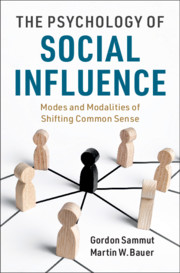Book contents
- The Psychology of Social Influence
- The Psychology of Social Influence
- Copyright page
- Dedication
- Contents
- Figures
- Tables
- Boxes
- Foreword 1
- Foreword 2
- Acknowledgements
- Chapter 1 Modalities of Social Influence
- Part I Recurrent Sources of Populism
- Part II Experimental Paradigms
- Part III Necessary Extensions
- Chapter 8 Agenda Setting, Framing and Mass Mediation
- Chapter 9 Designing and Resisting Artefacts
- Part IV Theoretical Integration
- References
- Index
Chapter 8 - Agenda Setting, Framing and Mass Mediation
from Part III - Necessary Extensions
Published online by Cambridge University Press: 19 December 2020
- The Psychology of Social Influence
- The Psychology of Social Influence
- Copyright page
- Dedication
- Contents
- Figures
- Tables
- Boxes
- Foreword 1
- Foreword 2
- Acknowledgements
- Chapter 1 Modalities of Social Influence
- Part I Recurrent Sources of Populism
- Part II Experimental Paradigms
- Part III Necessary Extensions
- Chapter 8 Agenda Setting, Framing and Mass Mediation
- Chapter 9 Designing and Resisting Artefacts
- Part IV Theoretical Integration
- References
- Index
Summary
Chapter 8 offers a development of thinking about social influence by considering the role of modern mass mediation. The chapter starts by looking at the role of communication in cultivating social representations of the world, both in formal and informal ways. It proceeds by reviewing several hypotheses concerning mass media effects, including diffusion, knowledge gap, cultivation, diegetic prototyping and serial reproduction. The chapter further considers the extended role of mass mediation in agenda setting, priming and framing issues for public consumption. The idea of a 'spiral of silence' best illustrates how mass media effect analysis adds a second level of analysis to the phenomena of social influence: the theory explicitly elaborates the notion of conformity in the context of modern mass mediation. Hence, the chapter asks a question rather than offering the answer: how do media effect theories elaborate social influence simultaneously on two levels, that of interaction and that of mass mediation. For example, how does this tie in with the rediscovery of crowds as 'internet bubbles' and 'echo chambers dominated by conformity bias and motivated reasoning'?
Keywords
- Type
- Chapter
- Information
- The Psychology of Social InfluenceModes and Modalities of Shifting Common Sense, pp. 163 - 187Publisher: Cambridge University PressPrint publication year: 2021
- 1
- Cited by

